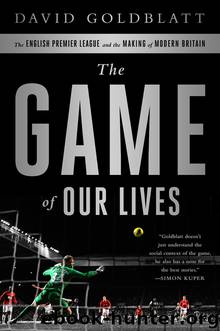The Game of Our Lives by David Goldblatt

Author:David Goldblatt [Goldblatt, David]
Language: eng
Format: epub
ISBN: 9781568585079
Publisher: Nation Books
IV.
The tone of the crowd, however two-faced and contradictory, was instantly understood by any black player or fan in English football. It took rather longer for it to reach the ears of government and the criminal justice system. Lord Justice Popplewell’s report on crowd safety was published in 1986 after a succession of football disasters and very public fights: the Bradford City fire, the disaster at Heysel, and major outbreaks of disorder at games in Luton and Birmingham. While the main concern of the report was a more general hooliganism, it noted the role of the far right in orchestrating racist chants and recommended that a specific offense of racial abuse at sports grounds be created. Lord Justice Taylor’s report, published five years later in the aftermath of the Hillsborough disaster, endorsed this view and the offense was duly legislated for in the Football Offenses Act 1991.28
Unsurprisingly the legislation, initially, made almost no difference at all. In the early 1990s racist chanting and singing remained a standard feature of almost every football ground in the country. Neither the clubs nor the police nor the FA made much use of the law, and all these constituencies remained wedded to the notion of racism as a subset of hooliganism, rather than a more widespread phenomenon performed by much larger swathes of the crowd than those engaged in fighting. As in the 1970s and 1980s, racism still came as crude abuse and insult but it could also be recoded as a joke, its mendacity hidden by a linguistic sleight of hand. At Millwall, where Tony Witter was lionized, his slim-framed, wiry black contemporary Bobby Bowry was hailed with the malicious, “Bobby Bowry’s an Ethiopian.” A similar metonymic slippage, this time from blackness to predatory criminality, was encoded in the chants of, “Oi! OJ!” and “OJ, where’s your gloves,” from white fans to black stewards. The stereotypical connection of black men to low-wage, low-status labor was made every time a crowd chanted, “Cab! Cab! Cab!” as black players ran past them.29
A transparent example of the form and scale of racist abuse was the treatment meted out to Ruud Gullit when playing for Chelsea against Everton as late as 1996.30 On the one hand his every move was met by boos, jeers, whistles and barracking; from the announcement of his name before the game to the final whistle. On the other hand, Chelsea’s other black players, Duberry, Newton, and Phelan, did not receive the same treatment at all. Gullit was perceived as an alien and as a threat for a myriad of reasons. Foreign, well-spoken, even erudite, his stylish continental masculinity, with football skills to match, ran against the grain of almost every unspoken social and sporting norm of the Everton crowd. Yet while they abused him for having long hair, and threatening the Everton goal, his race became visible. For the record the day’s epithets, from fans of all ages, included: “Get off the pitch ya fuckin’ gollywog! Fuck off the pitch ya fuckin’
Download
This site does not store any files on its server. We only index and link to content provided by other sites. Please contact the content providers to delete copyright contents if any and email us, we'll remove relevant links or contents immediately.
Futebol by Alex Bellos(1786)
No Hunger In Paradise by Michael Calvin(1563)
Pep Confidential by Martí Perarnau(1491)
Sir Matt Busby by Patrick Barclay(1284)
The Game of Our Lives by David Goldblatt(1236)
Cyrille Regis: My Story by Cyrille Regis(1233)
ALEX FERGUSON My Autobiography by Alex Ferguson(1221)
Football's Strangest Matches by Andrew Ward(1197)
No Nonsense by Joey Barton(1177)
The Lost Boys by Ed Hawkins(1147)
Cristiano Ronaldo: The Biography by Guillem Balague(1139)
Angels with Dirty Faces by Jonathan Wilson(1128)
Red Card by Ken Bensinger(1099)
Soccer Men: Profiles of the Rogues, Geniuses, and Neurotics Who Dominate the World's Most Popular Sport by Simon Kuper(1031)
We Are the Damned United by Phil Rostron(971)
A Season With Verona by Tim Parks(970)
Scholes : My Story (9781471125799) by Scholes Paul(947)
Eight World Cups by George Vecsey(918)
50 Complete Goalkeeping Training Sessions by Hageage Tamara Browder(915)
